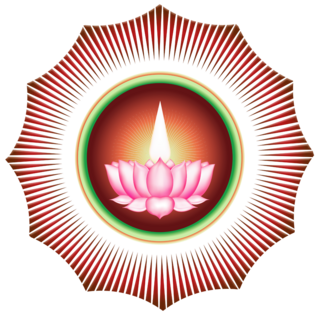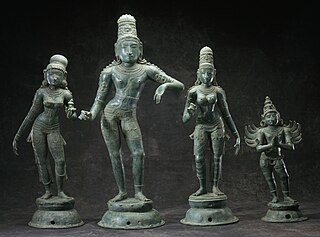Hinduism is the third largest religion in Malta after Christianity and Islam. However, it's not recognized as a formal religion. [1] [2] As of the 2021 census, there are 6,411 Hindus in Malta that constituted 1.42% of its population. [3]
In 2021, Charles J. Muscat wrote Ekam Sat: Il-Verità Waħda: Esperjenza tal-Veda Dharma Ġabra ta' testi ewlenin u riflessjonijiet prattići, an anthology of South Asian religious texts in Maltese including the Vedas and Upanishads. [4]
In 2010, there were about 840 Hindus in Malta. [5] According to the 2021 Census, there are 6,411 Hindus in Malta. of which 135 are Maltese Citizens and 6,276 Hindus are non-Maltese residents. Hindus form 0.04% of the Maltese Citizens and 6.02% of the non-Maltese residents. Hinduism is practiced mainly by the Indian Maltese and Nepalese Maltese people. [3]
The District wise Hindu Population of Malta is shown below: [3]
| District | Percentage of Hindus(%) | Population of Hindus | Total Population |
|---|---|---|---|
| South Harbour District | 1.11 | 749 | 67,175 |
| Northern Harbour District | 3.06 | 3224 | 1,05,309 |
| South Eastern District | 0.68 | 395 | 58,448 |
| Western District | 0.5 | 259 | 51,695 |
| Northern District | 2.53 | 1557 | 61,547 |
| Gozo and Comino District | 0.78 | 227 | 29,130 |
Northern Harbour District has the highest percentage of Hindus and Western District has the lowest percentage of Hindus. [3]
Majority of the Hindus in Malta is of Asian origin, mainly Indian and Nepalese Hindus. There are 286 Caucasian Hindus, 164 Hispanic/Latino Hindus, 107 African and 51 Arab Hindus. [3]
A first floor flat is used as a temporary Hindu meeting point that is known as Maltese-Indian Community Centre. [6]
Hindus in Malta privately celebrate Diwali, Holi, [7] Onam, [8] and other Hindu festivals.
Hindu deceased were buried using Catholic burial rites after the British left in 1964, rather than being cremated as required by their religion. Under British rule of Malta, cremation took place at the Lazaretto cemetery in Manoel Island.[ citation needed ] One Hindu leader in the United States, Rajan Zed, implored the Maltese government in 2019 to subsidize cremations abroad for Hindus in Malta. [9] [10] [11]
Hinduism, along with other Indian religions (like Buddhism, Sikhism and Jainism) and Judaism are not recognized in Malta and are treated as cults. [2] In 2010, Hindu and Jewish groups urged Pope Benedict XVI to intervene to ensure that Malta treats all religions equally before the law, but the Pope did not intervene. [1]
Hinduism is an Indian religion or dharma, a religious and universal order by which its followers abide. The word Hindu is an exonym, and while Hinduism has been called the oldest religion in the world, it has also been described as sanātana dharma, a modern usage, based on the belief that its origins lie beyond human history, as revealed in the Hindu texts. Another endonym for Hinduism is Vaidika dharma.

Hindus are people who religiously adhere to Hinduism, also known by its endonym Sanātana Dharma. Historically, the term has also been used as a geographical, cultural, and later religious identifier for people living in the Indian subcontinent.

Indian religions, sometimes also termed Dharmic religions or Indic religions, are the religions that originated in the Indian subcontinent. These religions, which include Buddhism, Hinduism, Jainism, and Sikhism, are also classified as Eastern religions. Although Indian religions are connected through the history of India, they constitute a wide range of religious communities, and are not confined to the Indian subcontinent.

The historical Vedic religion, also called Vedicism or Vedism, and sometimes ancient Hinduism or Vedic Hinduism, constituted the religious ideas and practices prevalent amongst the Indo-Aryan peoples of the northwest Indian subcontinent during the Vedic period. These ideas and practices are found in the Vedic texts, and some Vedic rituals are still practiced today. The Vedic religion is one of the major traditions which shaped modern Hinduism, though present-day Hinduism is significantly different from the historical Vedic religion.

In the field of comparative religion, many scholars, academics, and religious figures have looked at the relationships between Hinduism and other religions.

Balinese Hinduism, also known in Indonesia as Agama Hindu Dharma, Agama Tirtha, Agama Air Suci or Agama Hindu Bali, is the form of Hinduism practised by the majority of the population of Bali. This is particularly associated with the Balinese people residing on the island, and represents a distinct form of Hindu worship incorporating local animism, ancestor worship or Pitru Paksha, and reverence for Buddhist saints or Bodhisattava.

Hinduism is the main and largest religion of Nepal. In 2006, the country declared itself a secular country through democracy, after the abolition of its monarchy. According to the 2021 census, the Hindu population in Nepal is estimated to be around 23,677,744 which accounts for at least 81.19% of the country's population, the highest percentage of Hindus of any country in the world. Vikram Samvat, one of the two official calendars used in Nepal, is a solar Hindu calendar essentially the same to that widespread in North India as a religious calendar, and is based on Hindu units of time.

Hinduism in Trinidad and Tobago is the second largest religion. Hindu culture arrived to Trinidad and Tobago in 1845, with the arrival of the first Indian indentured laborers, the overwhelming majority of which were Hindu. According to the 2011 census there were 240,100 declared Hindus in Trinidad and Tobago.

Ayyavazhi is a Hindu denomination that originated in South India during the 19th century.

The history of Hinduism covers a wide variety of related religious traditions native to the Indian subcontinent. It overlaps or coincides with the development of religion in the Indian subcontinent since the Iron Age, with some of its traditions tracing back to prehistoric religions such as those of the Bronze Age Indus Valley Civilisation. Hinduism has been called the "oldest religion" in the world, but scholars regard Hinduism as a relatively recent synthesis of various Indian cultures and traditions, with diverse roots and no single founder, which emerged around the beginning of the Common Era.

Antyesti literally means "last sacrifice" or "final auspicious ceremony", and refers to the funeral rites for the dead in Hinduism, which usually involves cremation of the body. This rite of passage is the last samskara in a series of traditional life cycle samskaras that start from conception in Hindu tradition. It is also referred to as Antima Samskara, Antya-kriya, Anvarohanyya, or as Vahni Samskara.

Hinduism is the third-largest religious group in the United Kingdom, after Christianity and Islam; the religion is followed by over one million people representing around 1.6% of the total population. According to the 2021 United Kingdom census Hindus are primarily concentrated in England, particularly in Greater London and the South East, with just under 50,000 Hindus residing in the three other nations of the United Kingdom. Hindus have had a presence in the United Kingdom since the early 19th century, as at the time India was part of the British Empire. Many Indians in the British Indian Army settled in the United Kingdom of Great Britain and Northern Ireland.

Religion in Nepal encompasses a wide diversity of groups and beliefs. Nepal is a secular nation and secularism in Nepal under the Interim constitution is defined as "Religious and cultural freedom along with the protection of religion and culture handed down from time immemorial." That is, "The state government is bound for protecting and fostering Hindu religion while maintaining "Religious" and "Cultural" freedom throughout the nation as fundamental rights.
Hindu atheism or non-theism, which is known as Nirīśvaravāda has been a historically propounded viewpoint in many of the Astika (Orthodox) streams of Hindu philosophy. Hindu spiritual atheists, agnostics or non-theists who affirm the sanctity of the Vedas and the concept of Brahman, as well as those who follow astika (orthodox) philosophies but reject personal god(s), are also called Dharmic atheists, Vedic atheists or Sanatani atheists.

Catholic Christianity is the predominant religion in Malta. The Constitution of Malta establishes Catholicism as the state religion, and it is also reflected in various elements of Maltese culture.

India-Malta relations are the bilateral relations between India and Malta. Malta opened its High Commission in New Delhi in 2007 and has consulates in Chennai, Mumbai and Kolkata.

The practice of Hindu animal sacrifice is in recent times mostly associated with Shaktism, and in currents of folk Hinduism strongly rooted in local popular or tribal traditions. Animal sacrifices were part of the ancient Vedic Era in India, and are mentioned in scriptures such as the Puranas. The Hindu scripture Brahma Vaivarta Purana forbids the Asvamedha Horse sacrifice in this Kali Yuga. However, the perception that animal sacrifice was only practiced in ancient Non-Vedic Era is opposed by instances like Ashvamedha and other rituals that are rooted in Vedas. Both the Itihasas and the Puranas like the Devi Bhagavata Purana and the Kalika Purana as well as the Saiva and Sakta Agamas prescribe animal sacrifices.

The Indian community in Malta, about 6,900 people in 2023, is just under 0.5 percent of the population of Malta. Some families have been living in Malta since the country was a Crown colony.
Luke Montebello is a Maltese professional footballer currently playing for Maltese Premier League side Ħamrun Spartans, where he plays as a forward.

Israeli-Maltese relations are the official relations between the State of Israel and the Republic of Malta. Israel and Malta have maintained mixed relations since ties were established in 1965, with an extended period of tension in between 1973 and 1987. Israel-Malta relations encompass the diplomatic, economic, and cultural interactions between the State of Israel and the Republic of Malta. Despite the geographical distance that separates these two nations, their bilateral relationship has evolved over time, reflecting shared interests, diplomatic initiatives, and the pursuit of mutual cooperation.